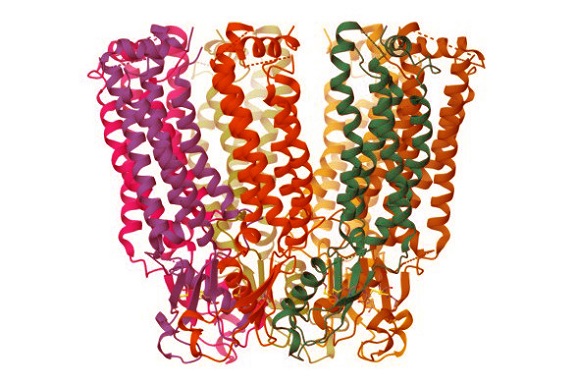Nikhil Prasad Fact checked by:Thailand Medical News Team Sep 06, 2025 5 months, 1 week, 1 day, 3 hours, 46 minutes ago
Medical News: Understanding Panx1 and Its Importance
Researchers from the Centro de Biotecnología Acuícola and the Departamento de Biología at the Facultad de Química y Biología, Universidad de Santiago de Chile, have published a comprehensive review on a tiny but powerful protein called Pannexin 1 (Panx1). This protein sits on the surface of many types of human cells and acts like a channel that releases chemical signals. These signals, such as ATP, play a vital role in how the body responds to infection, injury, and even cancer. According to this
Medical News report, Panx1 is not just a passive part of cells but an active regulator that can either boost or calm the immune system depending on the situation.
 Hidden Role of Panx1 in Inflammation, Immunity, Cancer and COVID-19 (Image: Cryo-EM structure of Pannexin1)
How Panx1 Works Inside the Body
Hidden Role of Panx1 in Inflammation, Immunity, Cancer and COVID-19 (Image: Cryo-EM structure of Pannexin1)
How Panx1 Works Inside the Body
Panx1 is made up of repeating units that form a pore, allowing small molecules to pass through the cell membrane. This function makes it essential for cell communication. The protein can be switched on by electrical changes, chemical signals, or even physical stress on the cell. Once activated, Panx1 releases ATP and other molecules into the surrounding environment. These molecules then act as “danger signals” that alert and mobilize the immune system. Interestingly, Panx1 does not only support protective immunity. In certain contexts, it may worsen inflammation or promote disease progression, showing its double-edged nature.
Panx1 in Infections and COVID-19
One of the most concerning findings is Panx1’s role in viral infections, particularly COVID-19. Studies show that when the SARS-CoV-2 spike protein interacts with lung cells, it can force Panx1 channels to stay open. This leads to a flood of ATP and other inflammatory substances, fueling the dangerous “cytokine storm” seen in severe COVID-19 cases. Drugs that block Panx1, such as probenecid, have been shown in laboratory models to reduce inflammation and even lower viral replication. This points to Panx1 as a potential treatment target for future therapies.
Panx1 and Cancer Progression
Panx1 also has a complex relationship with cancer. In breast and gastric cancers, it appears to promote tumor growth and spread by helping cancer cells change shape and migrate. However, in other cancers like gliomas or rhabdomyosarcoma, restoring Panx1 activity can slow down tumor progression and encourage cell death. This dual behavior shows that the role of Panx1 in cancer is highly dependent on the type of tumor and its surrounding environment.
A Potential Target for Future Medicine
The review highlights that Panx1 has already been linked to inflammatory conditions like rheumatoid arthritis, inflammatory bowel disease, cardiovascular disorders, and even neurodegenerative diseases. Blocking its activity in animal models has reduced harmful inflammation and improved survival in several conditions. However, no Panx1-sp
ecific drug has yet reached human clinical trials, as most current inhibitors were developed for other purposes. The challenge now is to design safe and targeted therapies that can control Panx1’s activity without affecting other critical cell functions.
Conclusion
The discovery of Panx1’s role in so many diseases underscores its importance as a master regulator of health and illness. It influences inflammation, immune system activity, and cancer in ways that are both protective and harmful. What makes Panx1 especially unique is its dual personality—it can act as both a promoter of disease and a defender, depending on the biological context. Developing therapies that target Panx1 may open up new frontiers in treating infections, autoimmune disorders, cancer, and even severe COVID-19. The challenge for researchers is to understand when blocking or boosting Panx1 will help patients the most. This delicate balance will determine whether Panx1 becomes one of the most powerful new drug targets of the future.
The study findings were published in the peer reviewed journal: Frontiers in Medicine.
https://www.frontiersin.org/journals/medicine/articles/10.3389/fmed.2025.1572418/full
For the latest research on Pannexin 1 (Panx1), keep on logging to Thailand
Medical News.
Read Also:
https://www.thailandmedical.news/news/covid-19-news-university-of-texas-study-finds-that-pannexin-1-channels,-atp-and-purinergic-receptors-play-key-roles-in-sars-cov-2-pathogenesis
https://www.thailandmedical.news/news/breaking-french-study-reveals-that-sars-cov-2-proteins-e-and-orf-3a-are-not-viroporins-as-previously-claimed-but-are-inducers-of-pannexin-currents
https://www.thailandmedical.news/news/researchers-from-brazil-suggest-that-targeting-receptors-involved-in-purinergic-signaling-can-help-treat-many-clinical-manifestations-of-covid-19
